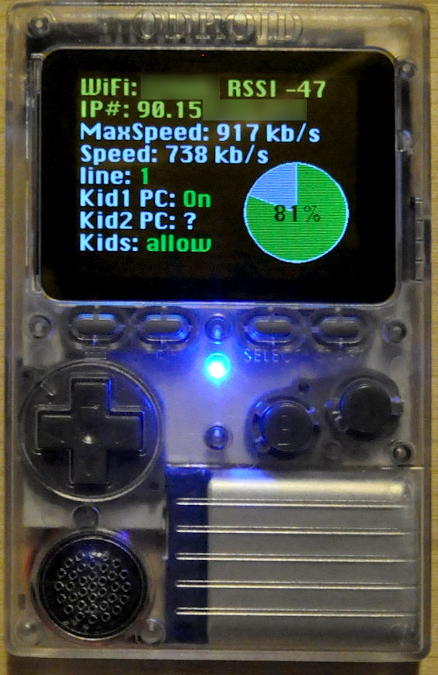September 2019 Archives
2019-09-22 22:47:24
ODROID GO as network tool
Hardkernel's ODROID GO handheld game kit is well known for his ability to emulate Gameboy and many more game consoles as also for ports of games like 3D Wolfenstein or Doom.
But with his versatile peripheral hardware like e.g. WiFi, Bluetooth and his expansion port with GPIO pins it allows a wide range of applications. Example applications with external hardware are a Weather Station and an Ultrasonic Distance Meter.
Programming is easy with the Arduino IDE even for novices. A lot of libraries are already available because ORDROID GO is based on the widely used ESP32 platform.
As first application I started developing of a "WiFi/network tool". Currently it can do some network tests and light configuration changes in our network. This is an example screenshot:

The Wifi connection works very well even through some walls. This Proof Of Concept is already very useful and I will continue to enhance it.
2019-09-20 23:22:47
Workaround for Unity installation issue "not enough space"
Some days ago my son told me that he had an issue on installing Unity via UnityHubSetup on Linux: Even with specifying TMPDIR and selecting home partition as installation target the installer did still show the (low) free disk space of the root partition.
There are several pages about this topic but apparently there's no easy solution for this issue. I told him that (assuming that you actually have enough free disk space) the disk space can be "faked" by pre-loading a shared library where the statfs() calls are wrapping the system calls and are "faking" the results.
As Proof-of-Concept and for educational purposes I wrote this fake library and a small shell script to control the Unity installer and the lib. A small issue is that the executable UnityHubSetup.AppImage is actually unpacking some kind of image and then starting the actual installer from this image. As a solution my script will launch UnityHubSetup.AppImage to get the image unpacked, then terminate UnityHubSetup.AppImage and finally start the real installer with the fake library preloaded. That causes the installer window flashing one time and then opening up finally.
Script and fake lib as archive: unityhubsetup-fake-diskspace.tar.gz
Content of the archive:
$ ls -1 unityhubsetup-fake-diskspace README launch-uhs-with-faked-increased-diskspace.sh wrap_statfs.c wrap_statfs.so
Some technical details: The actual free space is multiplied with a constant factor...
$ grep -B3 'resize_factor =' wrap_statfs.c /** * multiply free space with resize_factor */ static const int resize_factor = 16;
... and this is an implementation of a faked call:
$ fgrep -A9 'int statfs(' wrap_statfs.c
int statfs(const char *path, struct statfs *buf) {
int result;
write(2, MESSAGE_STATFS, (sizeof MESSAGE_STATFS) - 1);
actual_statfs = dlsym(RTLD_NEXT, "statfs");
result = actual_statfs(path, buf);
if (result == 0) {
SET(buf->f_blocks, buf->f_bfree, buf->f_bavail);
}
return result;
}